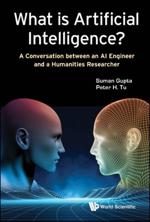A conversation between an AI engineer and a humanities researcher

Credit: World Scientific
What is Artificial Intelligence? What do the words ‘artificial’ and ‘intelligence’ mean? And what are the consequences of developing AI?
Instead of reiterating received definitions or surveying the field from a disciplinary perspective, Peter and Suman put two differing standpoints into conversation in their new book What is Artificial Intelligence? to engage with these questions and more.
Peter is an AI engineer: with his applied approach, he focuses on how to make AI work. Suman is a humanities researcher: his approach is conceptual and so he concentrates on what people and academics mean when they say ‘AI’.
Covering issues such as the meaning of ‘automation’ and ‘language’, What is Artificial Intelligence? A Conversation between an AI Engineer and a Humanities Researcher outlines some of the processes through which these concepts may be technologically grounded as AI. The book also covers the important issue of policy, discussing matters such as rights and responsibilities and comparing different countries’ data usage and state-level strategies.
This book will interest a broad readership, ranging from the general informed reader to those working in areas such as computing, philosophy or current affairs analysis. The book is appropriate for undergraduate students and upwards, or those whose interest is more conceptual than the general user of technology.
What is Artificial Intelligence? A Conversation between an AI Engineer and a Humanities Researcher retails for US$98 / £85 (hardcover) and is also available in electronic formats. To order or know more about the book, visit http://www.
###
About the Authors
Peter H Tu earned his BS degree in Systems Design Engineering from University of Waterloo, Canada, and DPhil in Engineering Science from Oxford University, UK. In 1990, Dr Tu joined Sony Research in Tokyo, Japan, where he developed a number of computer vision algorithms for man-machine interfaces. While at Oxford University, his research was devoted to the development of computer vision methods for the automatic analysis of seismic imagery. In 1997 he became a senior research scientist working at General Electric’s Global Research Center. In partnership with Lockheed Martin, he has developed a set of latent fingerprint matching algorithms for the FBI Automatic Fingerprint Identification System (AFIS). He has also developed optical methods for the precise measurement of 3D parts in a manufacturing setting. Dr Tu was the principal investigator for the FBI ReFace project, tasked with developing an automatic system for face reconstruction from skeletal remains. In 2006, he was the principal investigator for the National Institute of Justice’s 3D Face Enhancer Program. This work was focused on improving face recognition from poor quality surveillance video. In 2008, Dr Tu led the GE video analytics team that participated in the DHS STIDP demonstration program–the goal of STIDP is to establish an effective defence against suicide-bomber attack. He is the principal investigator for the DARPA-sponsored effort associated with group-level behaviour recognition at a distance. Currently Dr Tu is GE’s Chief Scientist for Artificial Intelligence. He has helped to develop a large number of analytic capabilities, including: person detection from fixed and moving platforms, crowd segmentation, multi-view tracking, person reacquisition, face modelling, face-expression analysis, face recognition at a distance, face verification from photo IDs and articulated motion analysis. Dr Tu has over 50 peer-reviewed publications and has filed more than 50 US patents.
Suman Gupta earned his MPhil degree in English from University of Delhi, India, and DPhil in English Literature from Oxford University, UK. Prior to joining the Open University in 2000, Gupta lectured at Nottingham University and the University of Surrey Roehampton (now Roehampton University). He has led a series of international collaborative projects since 2002, including: Globalization, Identity Politics and Social Conflict, 2002-2006; The Nigerian Film Industry and Independent Publishing in English in India, 2006-2008; a cluster of projects on English Studies in Non-Anglophone Contexts, 2007-2014; Framing Financial Crisis and Protest, Northwest and Southeast Europe, 2014-2016; and Entrepreneurial Literary Theory, 2016-2017. He has held visiting positions in Delhi University, India; Peking University, China; University of Texas Austin, USA; Federal University of Campinas, Brazil; CRASSH, Cambridge University, and Wolfson College, Oxford University, UK. He is Honorary Senior Research Fellow at Roehampton University. Gupta has authored 15 and edited 10 books, and published around 60 scholarly papers and chapters, in the areas of literary studies, cultural theory and politics. Books include: Corporate Capitalism and Political Philosophy (Pluto 2002), The Theory and Reality of Democracy (Continuum 2006), Globalization and Literature (Polity 2009), Imagining Iraq (Macmillan 2011), Philology and Global English Studies (Macmillan 2015), Usurping Suicide (Zed 2017, co-authored with M Katsarska, T Spyros and M Hajimichael).
About World Scientific Publishing Co.
World Scientific Publishing is a leading international independent publisher of books and journals for the scholarly, research and professional communities. World Scientific collaborates with prestigious organisations like the Nobel Foundation and US National Academies Press to bring high quality academic and professional content to researchers and academics worldwide. The company publishes about 600 books and over 140 journals in various fields annually. To find out more about World Scientific, please visit http://www.
For more information, contact Natalya at [email protected].
Media Contact
Natalya Kahn
[email protected]
Original Source
https:/




